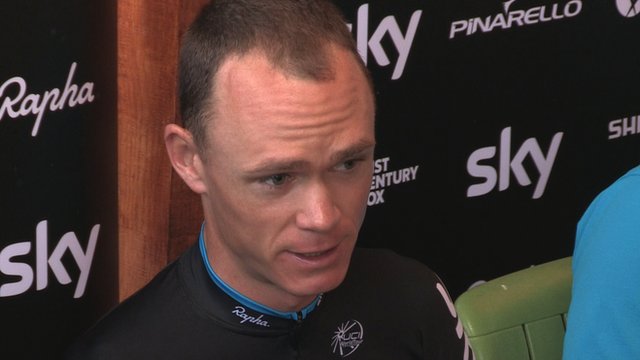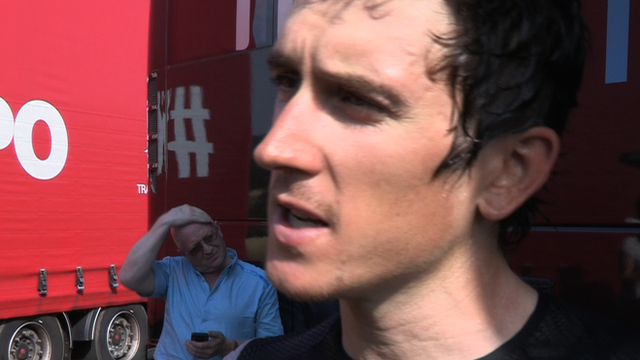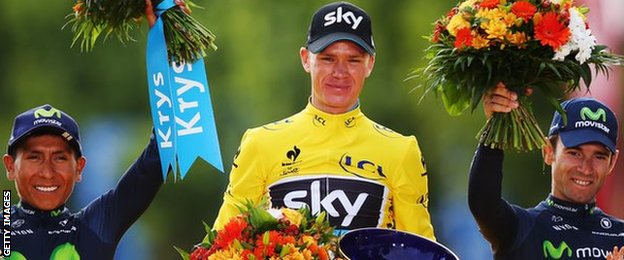Chris Froome: Athletics should follow cycling anti-doping lead – BBC Sport
Britain’s double Tour de France champion Chris Froome has urged athletics to follow cycling’s lead and invest a lot more money in anti-doping.
Cycling’s problems with drugs
are well documented
but the sport’s blackest days appear to be behind it.
But the
ongoing doping allegations
in athletics threaten to overshadow this month’s World Championships in Beijing.
“From what I understand, the testing hasn’t been at the level that it is in cycling,” Froome told BBC Sport.
He said the International Cycling Union (UCI) spends about four times what the International Association of Athletics Federations (IAAF) does on testing.
“It is going to have to invest a lot more heavily in anti-doping,” he added. “That would be a step in the right direction.”
Track and field’s governing body spends about £1.3m a year on anti-doping, whereas its cycling equivalent spends closer to £6m, although much of that comes from the professional teams as a condition of their licences to race in UCI competitions.
“I believe some things have changed quite substantially [for cycling] since the dark ages of 10 to 15 years ago when the sport was really dirty,” said Froome, in an exclusive interview with the BBC’s sports editor Dan Roan.
“The testing has really evolved and the UCI has now implemented 24-hour testing. I have every confidence that the system now really works.”
The 30-year-old Briton, who confirmed this week he will be
lining up at the Vuelta
later this month, revealed that he had been tested at his Monaco apartment on Sunday night and had no problem with being woken up at 3am by testers, if that is what it takes to assure fans he is clean.
How has athletics reached this point?
Earlier this year, a BBC investigation
revealed allegations of doping
by leading US track coach Alberto Salazar and one of his star pupils, American distance runner Galen Rupp.
Both men deny the claims.
This hit the sport hard, especially coming after revelations about the apparent return of state-sponsored doping in Russia, as well as lingering distrust of the quality of testing in athletics powerhouses Kenya and Jamaica.
But worse was to come earlier this month when a joint investigation by German broadcaster ARD and British newspaper The Sunday Times uncovered a decade’s worth of suspect blood values that cast a shadow over six World Championships and three Olympics.

Please turn on JavaScript. Media requires JavaScript to play.
Froome, speaking during the 2015 Tour de France, questioned critics
The sense of crisis has not been helped by the fact the IAAF is also in the midst of an election battle to replace long-standing president Lamine Diack, with the two contenders, Ukrainian pole vault legend Sergey Bubka and British running great Lord Coe, trading promises to get tougher with cheats while simultaneously
suggesting the sport is being unfairly treated.
A familiar story for cycling
Cycling fans watched the sport almost destroy itself by failing to face up to its obvious problems, often wasting resources on attacking the messenger instead.
The legacy of cycling’s tainted era is all too obvious to Froome, who has been subjected to constant sniping about his performances since his breakthrough at the 2011 Vuelta, where he finished second, and subsequent
Tour wins in 2013 and 2015.
The sniping got nasty this year, with one fan
throwing urine at him
on a mountain stage and others spitting at him. His team-mate Richie Porte was even punched during one stage.

Please turn on JavaScript. Media requires JavaScript to play.
Geraint Thomas condemned the abuse some of the riders got at the Tour
The Team Sky rider is philosophical about this now, saying he does not blame the tiny minority of wrongdoers on the roadside: his anger is directed at “supposed cycling experts” in the media who cast suspicions about his performances.
“(The fans) were only following the words of the media who were saying this team is not believable,” he said.
“If the public is told that enough times by journalists, it’s only natural that’s what people will believe.
“But I don’t think any sportsman should have to go through what we went through during this year’s Tour de France.”
In an attempt to dispel the “negativity” that surrounded Froome in the days immediately after his superb victory in the Tour’s 10th stage,
Team Sky released his performance data
from that day’s final climb, and he has also promised to undergo independent physiological tests that he will share publicly.
“It’s something I wanted to do from the start of the season, even before all this came up during the Tour,” he said.
“The physiological testing could even help me understand what makes me who I am and what it is about me that allows me to make the efforts I do.”
He added that he was “open” to doing the
VO2 Max test
that many pundits have been asking for, and plans were in place to do the peak oxygen uptake assessment but he “would not be rushing into it”.
“I do want to be a spokesman for clean cycling,” he said. “I believe somebody has to stand up for the current generation.
“I’m happy to do that. I’m happy to release more information when I can and to show people they can trust these performances.”
Transparency and trust

Chris Froome made history as the first Briton to win the Tour de France twice
These attempts to answer his critics’ doubts have parallels with the efforts of British athletes Mo Farah, Jenny Meadows and Jo Pavey, who this week
gave their blood profiles
to The Sunday Times in a bid to prove their commitment to clean sport.
Froome supports this move but ultimately hopes fans will come to trust elite athletes again, certainly in his sport.
“You turn yourself inside out on training camps trying to get yourself ready for the Tour de France and you do an amazing ride – and all of a sudden it’s seen with a lot of negativity and doubt,” he said.
“You think: ‘Hold on a minute, are we all just wasting our time here?’ If a good performance is just going to get ripped apart, what are we doing?
“That’s what sport is all about, that’s why you strive to be the best athlete you can be.
“If you’re just going to pull these people down, then there’s no point.”




